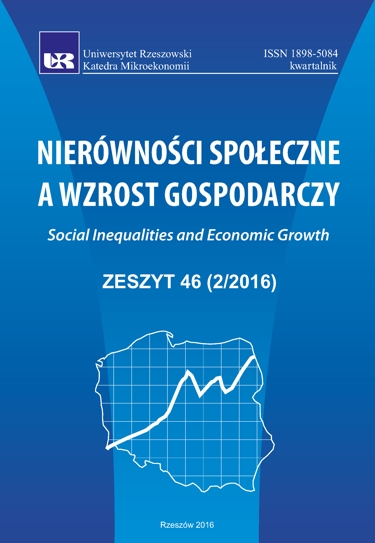Zarządzanie wiekiem jako sposób przeciwdziałania nierównościom społeczno-ekonomicznym oraz konfliktom międzypokoleniowym w przedsiębiorstwie
DOI:
https://doi.org/10.15584/nsawg.2016.2.25Słowa kluczowe:
zarządzanie wiekiem, kształcenie ustawiczne, podmiotowość, starzenie się społeczeństwa, rynek pracyAbstrakt
Od ponad 30 lat starzenie się ludności i niska dzietność w Europie Zachodnie traktowane jest jako zagrożenie dla rynku pracy. Według prognoz w 2050 r. liczba osób w wieku produkcyjnym będzie stanowiła jedynie 56% społeczeństwa. Potrzebne zatem będzie zatrudnianie osób w późnym wieku produkcyjnym lub wręcz poprodukcyjnym. Osoby starsze, chcące pozostać na rynku pracy, często jednak są dyskryminowane ze względu na swój wiek i natrafiają na wiele trudności związanym z nierzadko fałszywymi przekonaniami odnośnie do ich zdolności efektywnego funk-cjonowania w organizacji. Potrzeba zatem zmiany nastawienia przedsiębiorców wobec zatrudnia-nia osób starszych i gotowości do adekwatnych zmian w środowisku pracy. Należy zadać sobie pytanie, w jaki sposób bardziej racjonalnie i efektywnie zarządzać zasobami ludzkimi, tak by wykorzystać – z zyskiem dla wszystkich stron – różnorodność wiedzy, doświadczeń i potrzeb pracow-ników w różnym wieku. Rozwiązaniem w tej sytuacji może być aktywna, prewencyjna polityka zarządzania wiekiem, która owocuje ulepszeniami w środowisku pracy i zmianami w kulturze organizacyjnej, promocją zdrowia i zindywidualizowanych sposobów zwiększania możliwości efek-tywnego funkcjonowania. Pozwala ona także nie tylko utrzymać wydajność i jakość pracy w okresie starzenia, ale jest także korzystna dla pracowników wszystkich grup wiekowych. Z kolei dzięki kulturze organizacji, która promuje czerpanie z różnorodności oraz szanuje podmiotowość pracowników zminimalizować można problem dystansu międzypokoleniowego i konfliktów wynikających z różnych potrzeb, perspektyw i sposobów działania osób w starszym i młodszym wieku.Downloads
Download data is not yet available.
Pobrania
Opublikowane
2020-11-10
Jak cytować
Pawlak, J. (2020). Zarządzanie wiekiem jako sposób przeciwdziałania nierównościom społeczno-ekonomicznym oraz konfliktom międzypokoleniowym w przedsiębiorstwie. Nierówności Społeczne a Wzrost Gospodarczy, 2(46), 408–418. https://doi.org/10.15584/nsawg.2016.2.25
Numer
Dział
Artykuły
Licencja
Prawa autorskie (c) 2016 Uniwersytet Rzeszowski

Utwór dostępny jest na licencji Creative Commons Uznanie autorstwa – Na tych samych warunkach 4.0 Miedzynarodowe.


